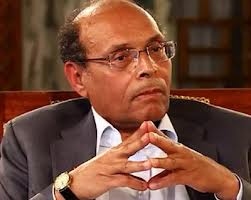By James Mackenzie
 VALLETTA (Reuters) – Tunisian President Moncef Marzouki called on Saturday for the creation of a regional task force to deal with the “humanitarian disaster” which has killed thousands of desperate African migrants trying to reach Europe in small, unseaworthy boats.
VALLETTA (Reuters) – Tunisian President Moncef Marzouki called on Saturday for the creation of a regional task force to deal with the “humanitarian disaster” which has killed thousands of desperate African migrants trying to reach Europe in small, unseaworthy boats.
Speaking at the conclusion of a meeting of European and north African leaders in Malta, Marzouki said the task force would have to coordinate work already being done by foreign and interior ministries as well as regional bodies.
“We don’t want this to be a military operation, we want this to be a humanitarian operation,” he said. “We cannot accept having hundreds and thousands of people drowning in the sea.”
But he warned that a solution to the problem at the heart of the crisis, instability, persistent poverty and destructively high youth unemployment in Africa, was still a distant prospect.
“We need time, we cannot do miracles in a few months,” he told a news conference at the end of the meeting.
“Independent systems have been badly damaged, the security system, the health system, the judiciary system have all been badly damaged,” he said.
The succession of small, overcrowded migrant boats that still attempt the dangerous crossing from north Africa to Sicily, Malta and other islands has long reflected the pressure being created by poverty in the region.
While the problem is now less intense since Western governments stepped up cooperation with North African countries in the wake of the Arab spring revolutions, migrant boats still regularly show up in southern Europe. As recently as last month, dozens of people are believed to have died when a boat sank near Lampedusa off Sicily.
Marzouki’s comments underlined the pressing desire of the newly established governments in countries like Libya and Tunisia for support from the European Union as well as worries in Europe about the potential spread of instability.
The killing of U.S. ambassador Christopher Stevens in Libya and the sacking of the U.S. Embassy in Tunis last month in protests over an anti-Islamic video provided a sharp reminder of how fragile the situation remains in the region.
5+5 MEETING
The first meeting of leaders from the so-called 5+5 group of countries since the “Arab spring” revolutions, produced few concrete decisions and was billed mainly as a forum for dialogue between countries in the western Mediterranean.
Algeria, France, Italy, Libya, Malta, Mauritania, Morocco, Portugal, Spain and Tunisia form an informal smaller group of countries alongside the 43-member Union for the Mediterranean launched by former French President Nicolas Sarkozy in 2008.
With the southern European countries struggling to stave off their worst financial crisis since World War Two, there was little prospect of any immediate financial assistance from the meeting in Malta on Friday and Saturday.
On the European side, interest was divided between the tantalizing but still distant hope of creating a stable, prosperous region across the Mediterranean and the immediate problem of containing instability.
“If we can succeed in avoiding a transformation of the Arab spring into an Arab autumn or even a freezing winter, that will be a great investment in the European economy,” Italian Prime Minister Mario Monti said.
A statement issued after the meeting condemned the violence in Syria and called for broader cooperation across the region.
.






